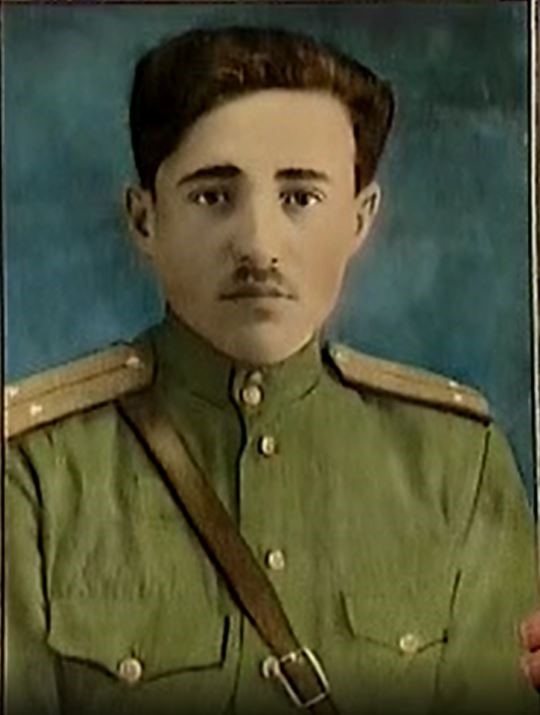Boris Faibisovich was born in 1922 in the town of Pochep in western Russia, not far from the Ukrainian and Belorussian borders. His father Yuda (who would later change his name to Adolf) was a mechanic, who frequently moved between employers. Boris' mother was a homemaker, but, after his father's death in 1935, she had to go out to work. The family was Russian-speaking and far removed from religion. In 1939, Faibisovich enrolled in the Infantry School in Bezhitsa (which has since become part of the city of Briansk). In April 1941, he finished this school in the rank of lieutenant. He was attached to the 884th Rifle Regiment, which was then deployed in eastern Ukraine, as the commander of a machine-gun platoon.
In early July 1941, on the tenth day of the Soviet-German War, Faibisovich's regiment, along with the rest of the 5th Army, was assigned to defend the approaches to Kiev. In August 1941, the decimated 5th Army retreated to Cherkassy (southeast of Kiev), where it was able to hold the enemy back for about a month. In September 1941, Faibisovich was taken prisoner by the Germans.
Despite his markedly "Jewish" appearance, Faibisovich stubbornly insisted that he was a Russian during the first, hasty screening for Jews among the POWs, and the German officer in charge left him alone. However, he realized that his Jewishness would inevitably come to light after his arrival at a POW camp. During one of the marches en route to the final camp, Faibisovich and his Russian friend Viktor managed to escape. They walked in the direction of Briansk, hoping to either rendezvous with the Red Army or join the Soviet partisans. On the way, Viktor fell ill and stayed behind in a village; Faibisovich went on alone. He was told by Lysakov, the first Soviet partisan commander whom he met in the Briansk area: "Hey, you are from Pochep, aren't you? So, you should go to Pochep for reconnaissance!" Faibisovich realized that this assignment was a provocation, and that it would put him in grave danger – since he could easily be identified as a Jew in his native town. Luckily, on his way through the "partisan zone", he ran into a higher-ranking partisan commander, Mikhail Yudin, to whom he related his story and the assignment he had received. Upon hearing this, Yudin exploded with rage, using the filthiest obscenities, and said:
"What kind of a commander is this Lysakov? He is sending a Jew to do reconnaissance in his town!" 1
Yudin countermanded the first order and took Faibisovich to his partisan unit, named "Semion Budionnyi", to serve as commander of the unit's reconnaissance platoon
During the German anti-partisan operations in July 1942, Faibisovich was seriously wounded. His right hand was amputated in a partisan hospital. Faibisovich was flown over to the Soviet side in the next airplane to be dispatched from the partisan headquarters, and he underwent further treatment at a stationary hospital in Tambov.
Despite his injuries, the one-handed Faibisovich was not immediately discharged from the military, but continued serving, according to the law. In 1943, Lieutenant Faibisovich was sent to a provincial recruitment office in Kazakhstan, where he was responsible for working with youth of premilitary age. He was later promoted to the rank of senior lieutenant and appointed head of a sniper school for girls. It was there that he met his future wife.
In the course of the war, Faibisovich was awarded the medal "To a Partisan of the Patriotic War", 1st class, and the Order of the Patriotic War, 2nd class. His mother and sister survived in the partisan zone, being protected by the "Semion Budionnyi" unit.
After the war, Boris Faibisovich returned to Pochep, later moving to the larger city of Briansk. He worked in the administrative apparatuses of both localities. His good connections with former partisan commanders in the Briansk area, coupled with the prestige he enjoyed among them, helped him survive the Stalinist anti-Jewish campaign of 1948-53, and continue his administrative career.
- 1. YVA O.93/28809







